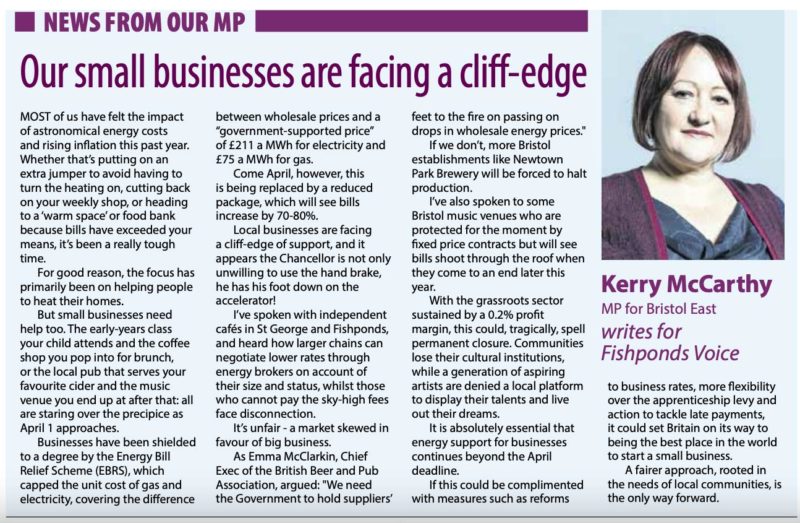Kerry McCarthy Labour MP for Bristol East
Kerry writes for Fishponds Voice, March 2023
Most of us have felt the impact of astronomical energy costs and rising inflation this past year. Whether that’s putting on an extra jumper to avoid having to turn the heating on, cutting back on your weekly shop, or heading to a ‘warm space’ or food bank because bills have exceeded your means. It’s been a really tough time.
For good reason the focus has primarily been on helping people to heat their homes. But small businesses need help too. The early-years class your child attends and the coffee shop you pop into for brunch, or the local pub that serves your favourite cider and the music venue you end up at after that: all are staring over the precipice as April 1st approaches.
Businesses have been shielded to a degree by the Energy Bill Relief Scheme (EBRS) which capped the unit cost of gas and electricity, covering the difference between wholesale prices and a “government-supported price” of £211 a MWh for electricity and £75 a MWh for gas. Come April, however, this is being replaced by a reduced package which will see bills increase by 70-80%.
Local businesses are facing a cliff-edge of support, and it appears the Chancellor is not only unwilling to use the hand brake; he has his foot down on the accelerator!
I’ve spoken with independent cafés in St George and Fishponds and heard how larger chains can negotiate lower rates through energy brokers on account of their size and status, whilst those who cannot pay the sky-high fees face disconnection. It’s unfair – a market skewed in favour of big business. As Emma McClarkin, Chief Exec of the British Beer and Pub Association, argued – “We need the Government to hold suppliers’ feet to the fire on passing on drops in wholesale energy prices”. If we don’t, more Bristol establishments like Newtown Park Brewery will be forced to halt production.
I’ve also spoken to some Bristol music venues who are protected for the moment by fixed price contracts but will see bills shoot through the roof when they come to an end later this year. With the grassroots sector sustained by a 0.2% profit margin, this could, tragically, spell permanent closure. Communities lose their cultural institutions, while a generation of aspiring artists are denied a local platform to display their talents and live out their dreams.
It is absolutely essential that energy support for businesses continues beyond the April deadline.
If this could be complimented with measures such as reforms to business rates, more flexibility over the apprenticeship levy, and action to tackle late payments it could set Britain on its way to being the best place in the world to start a small business. A fairer approach, rooted in the needs of local communities, is the only way forward.

